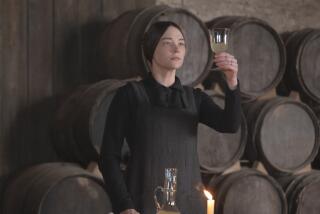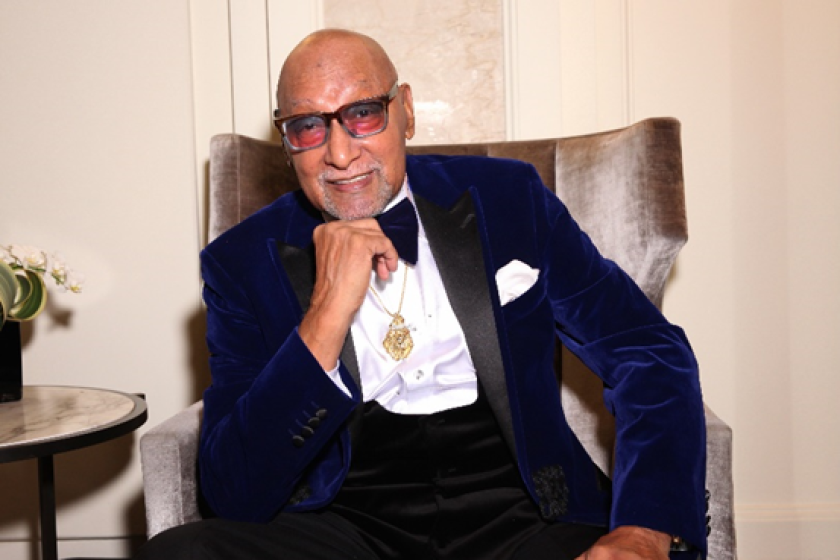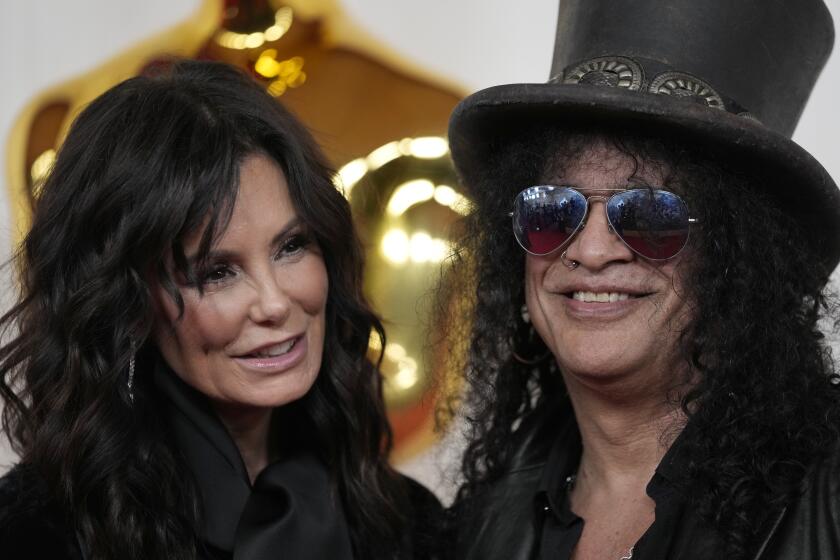Capsule movie reviews
Andy Warhol star Candy Darling loved movies so much that she strived to live in that projected flicker between illusion and reality. A transgender icon with a life as tragically short as some of the idols she worshipped, she’s the deserving subject of an archivally rich remembrance, and such is James Rasin’s poignant documentary “Beautiful Darling.”
Using plenty of movie clips (“Flesh,” “Women in Revolt”), new interviews on camera and old ones recorded by close friend Jeremiah Newton after her 1974 death, footage of her star-making off-off Broadway shows and readings from letters and diaries (with Chloë Sevigny as Candy), Rasin helps recapture the outré sparkle of her self-created glamour. At the same time, he sensitively threads in the outsider’s sadness that never dissipated from her troubled youth as cross-dressing suburban boy James L. Slattery.
The allure of fame and the cruelty of an alienated life are the parallel engines here — being championed and discarded by a clique-ish artist, fed by attention but hustling to survive — so by the time we see the Hurrell-like deathbed portrait she arranged when cancer was eating away at her, the strange folly of her movie-mad existence reaches a pitiable conclusion.
“Beautiful Darling” is sympathetic and critical, a sobering reminder in this fame-grabbing age of a time when gender politics, art and artifice could make for a turbulent identity cocktail.
— Robert Abele
“Beautiful Darling.” No MPAA rating: Running time: 1 hour, 26 minutes. At the Downtown Independent, Los Angeles.
In his feature debut as a writer-director, Mike Goldbach looks to shake up the coming-of-age teen comedy with “Daydream Nation,” a fitfully engaging effort that is most successful as a performance piece for actors Kat Dennings and Reece Thompson.
The story follows a young woman (Dennings) who becomes romantically involved with one of her high school teachers (Josh Lucas) after moving with her father to a new town. She picks up another student (Thompson) largely as cover, but she soon finds herself torn between suitors. Dennings’ affably disaffected wiseacre is an unlikely fit with Thompson’s earnest, stammering stoner, giving the film an exciting sense of friction, though a serial killer subplot comes off as unnecessary.
The film is at its best when it plays like “The Last Seduction” retrofitted to high school, with Dennings as the big-city sharpie who runs rings around the small-town rubes she tries to amuse herself with.
At some point, the actress will find a role that will give her the same career bounce Emma Stone got from last year’s “Easy A,” helping her transition away from sidekick roles like the one Dennings has in “Thor” onto center stage. “Daydream Nation” is simply not that movie.
— Mark Olsen
“Daydream Nation” MPAA rating: R for drug and alcohol use, sexual content, language and some violent images, all involving teens. Running time: 1 hour, 38 minutes. At Laemmle’s Sunset 5, West Hollywood.
The signal importance of executive producer Brian Wendel and writer-director Lee Fulkerson’s richly inspiring and informative documentary “Forks Over Knives” lies in its persuasive presentation of solutions to unhealthful eating habits. The film centers largely on the work of T. Colin Campbell, a professor emeritus of Nutritional Biochemistry at Cornell, and Dr. Caldwell B. Esselstyn, a renowned former surgeon at the esteemed Cleveland Clinic.
Both investigated exhaustively the role of nutrition in health. Campbell co-wrote the monumental “The China Study,” a survey of the relationship between nutrition and cancer in Chinese people; Esselstyn wrote among many other publications, “Prevent and Reverse Heart Disease,” based on his long-term nutritional research on arresting and reversing artery disease, even in severely ill patients.
The bottom line: Whole plant foods are beneficial, while animal-based foods are not. Furthermore, whole plant foods prove to be genuinely satisfying, though junk food, which can be so pleasurable to eat, is so lacking in real nourishment that it causes one to crave more of it, which then escalates cholesterol levels and calorie intake.
“Forks Over Knives” — eating right over surgery — explains in unflinching detail how we damage ourselves through our eating habits yet insists that it is within our grasp to change course. Many nutritional experts bolster Campbell and Esselstyn’s arguments, and patients attest to Esselstyn’s life-saving treatments.
To his credit, Fulkerson, who had been dangerously out of shape, turned his life around in making this most important and heartening documentary.
— Kevin Thomas
“Forks Over Knives.” Rated PG for thematic elements and some incidental smoking. Running time: 1 hour, 36 minutes. At selected theaters.
Alternately ambitious and simplistic, lively and bland, the French-produced adventure “Mia and the Migoo” never fully pinpoints its intended audience or many ecological messages. Still, this generally involving film is gorgeous to watch thanks to its 500,000 hand-painted frames of vibrantly colored, enormously artistic animation.
Mia (voiced by Amanda Misquez) is a spirited young girl on a dangerous journey in search of her widowed father, a worker on a remote construction site, unaware that he’s become trapped in a mysterious landslide. Jekhide (John DiMaggio), the site’s nasty-greedy developer, jets out to the tropical location to assess the damage but must drag along the sweet son (Vincent Agnello) he habitually ignores.
Enter the Migoo (Wallace Shawn), a self-replicating, monsterish thing (it resembles the love child of SpongeBob SquarePants and the Michelin Man) that guards the magical Tree of Life — a sort of world barometer — located smack in the middle of Jekhide’s project. Mia’s befriending of the loopy Migoo proves key to her mission, but the pairing, though sometimes inspired, could have resulted in more memorable fun.
Directed by Jacques-Rémy Girerd from a script he wrote with a trio of other scribes, “Mia” also features the voices of Matthew Modine (a producer of this new, English-language version), Whoopi Goldberg and James Woods in smaller, nondistinct roles.
Go for the fantasy, stay for the art.
— Gary Goldstein
“Mia and the Migoo.” MPAA Rating: PG for thematic elements, some peril and brief mild language. Running time: 1 hour, 31 minutes. At Laemmle’s Sunset 5, West Hollywood.
Writer-director Mitch Glazer’s leaden noir fantasy “Passion Play” stars two impossible faces — Mickey Rourke’s vulnerable cauliflower mug and Megan Fox’s open-mouthed pleasure pout — in a story about a down-on-his-luck jazz trumpeter who becomes obsessed with a carnival birdwoman.
After a narrow desert escape from being bumped off by a hit man for a wealthy gangster named Happy (Bill Murray), whose woman he slept with, Nate (Rourke) wanders into a Mexican carnival run by a dangerously insane Brit (Rhys Ifans) and meets Fox’s Lily, a brunet in a glass box whose wings are real. The pair develops a romantic bond as life-broken performers, but Happy decides he wants Lily as his own caged possession.
Inexplicably filmed in a handful of styles — including, bizarrely, obviously processed shots — by cinematographer Christopher Doyle, “Passion Play” would be midnight-movie fodder if it weren’t so drearily wrapped up in its wounded-male aesthetic and a clumsy approach to art-movie moodiness that was abandoned in the ‘80s.
Murray has his arhythmically funny menace, but Rourke and Fox are more a sideshow couple than a believable main attraction.
— Robert Abele
“Passion Play.” MPAA rating: R for language, some sexuality/nudity, violence and brief drug use. Running time: 1 hour, 34 minutes. At Mann’s Chinese 6, Hollywood.
More to Read
The biggest entertainment stories
Get our big stories about Hollywood, film, television, music, arts, culture and more right in your inbox as soon as they publish.
You may occasionally receive promotional content from the Los Angeles Times.






